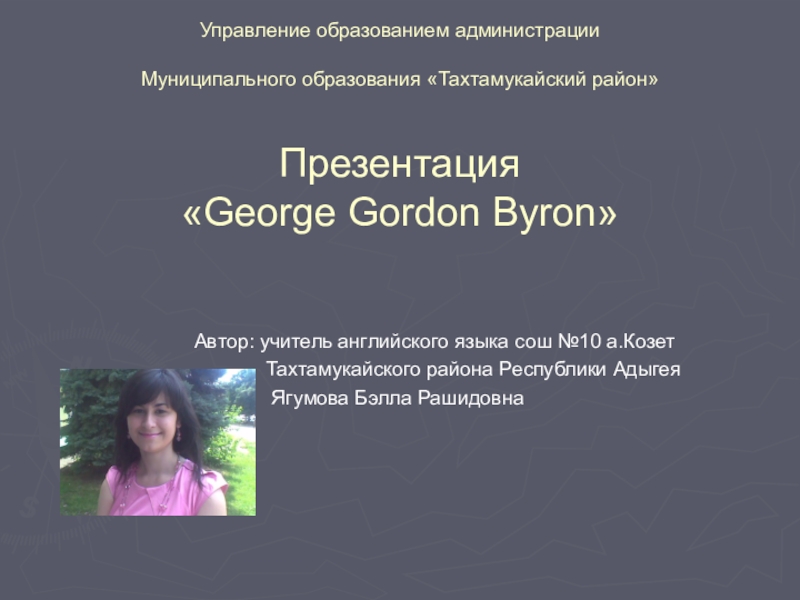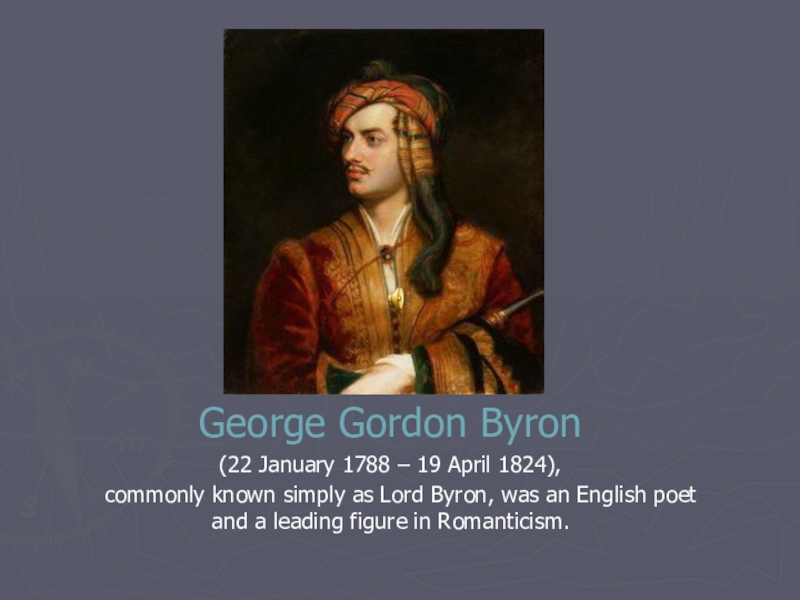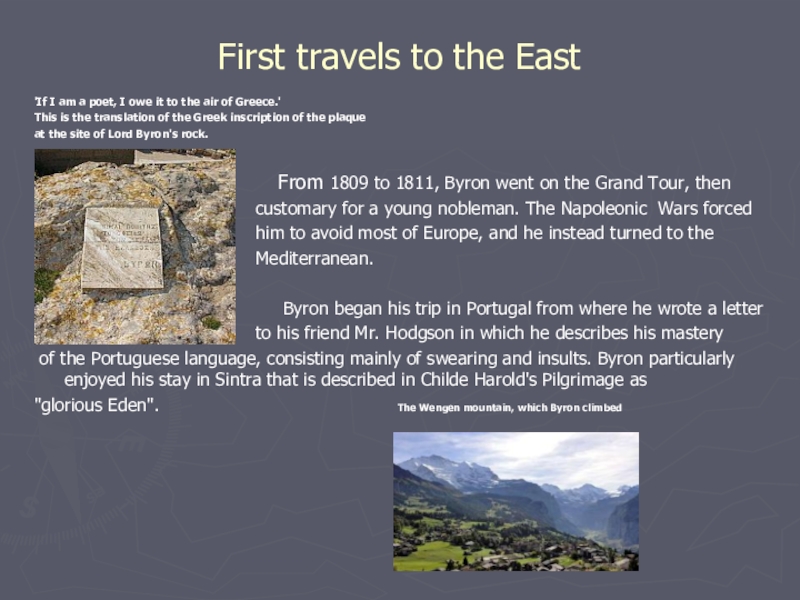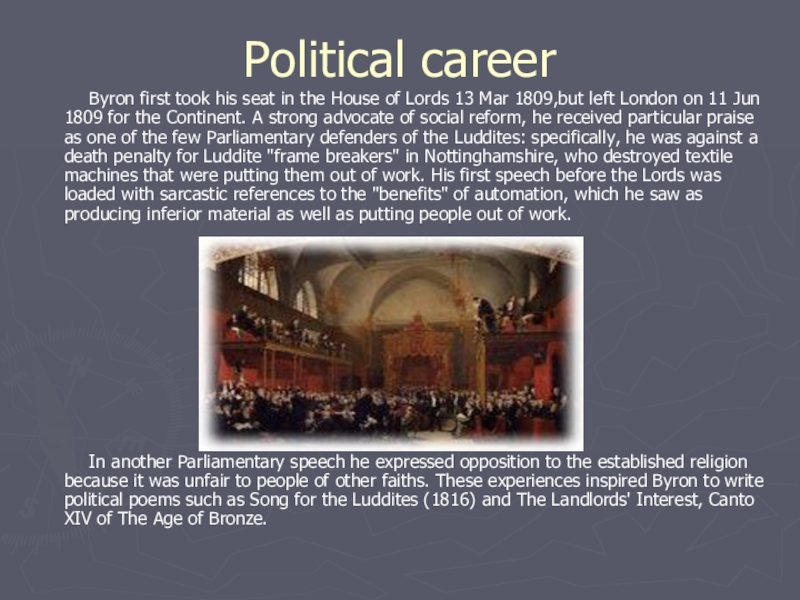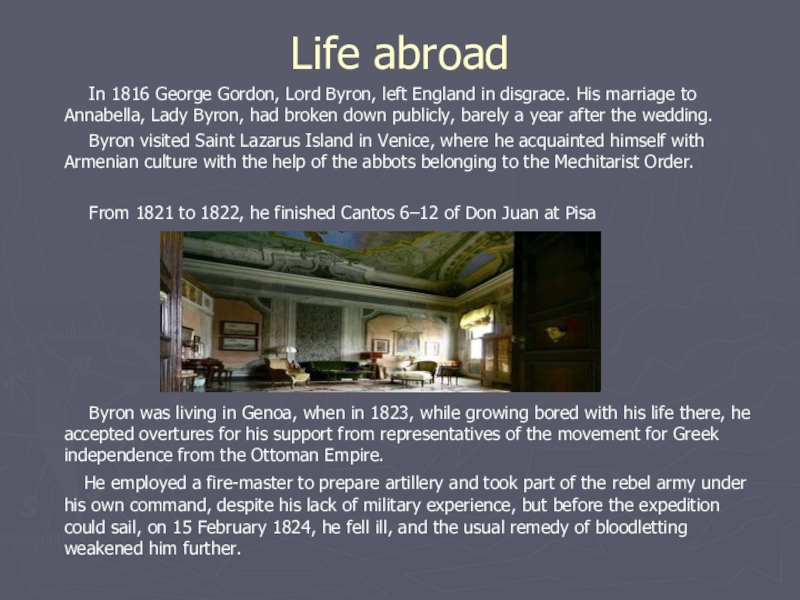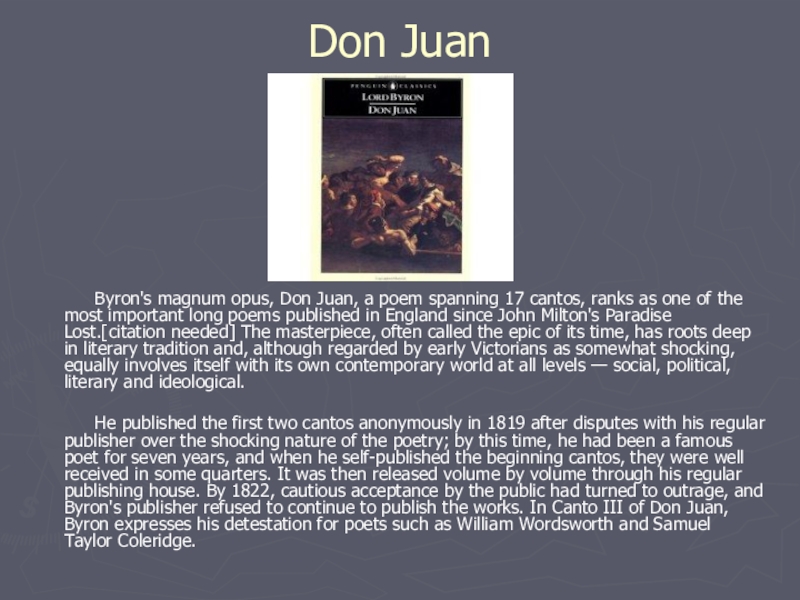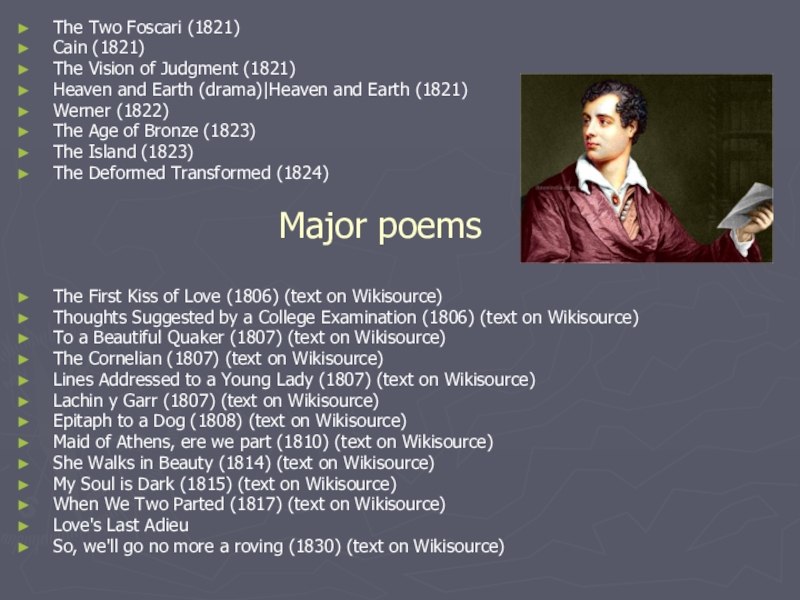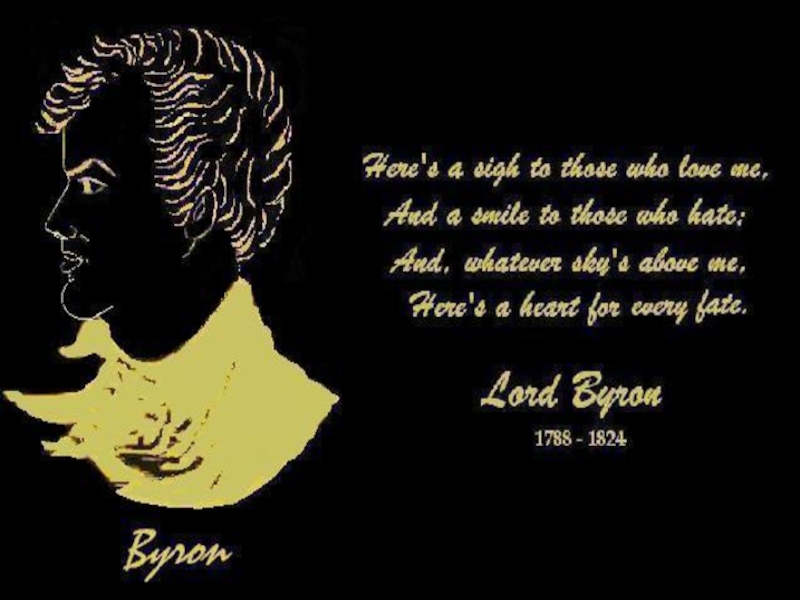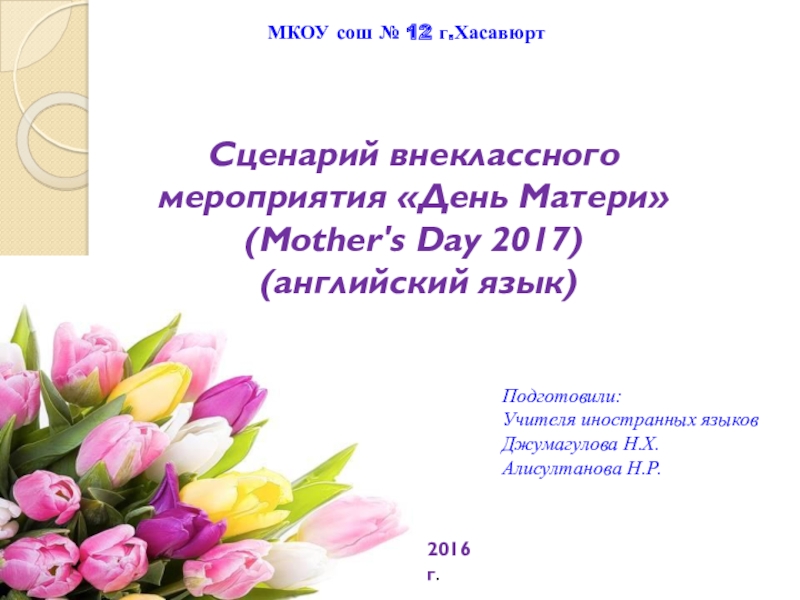английского языка сош №10 а.Козет
Тахтамукайского района Республики Адыгея
Ягумова Бэлла Рашидовна
- Главная
- Разное
- Образование
- Спорт
- Естествознание
- Природоведение
- Религиоведение
- Французский язык
- Черчение
- Английский язык
- Астрономия
- Алгебра
- Биология
- География
- Геометрия
- Детские презентации
- Информатика
- История
- Литература
- Математика
- Музыка
- МХК
- Немецкий язык
- ОБЖ
- Обществознание
- Окружающий мир
- Педагогика
- Русский язык
- Технология
- Физика
- Философия
- Химия
- Шаблоны, фоны, картинки для презентаций
- Экология
- Экономика
Презентация, доклад по английскому языку на тему Джордж Гордон Байрон/George Gordon Byron (9 класс)
Содержание
- 1. Презентация по английскому языку на тему Джордж Гордон Байрон/George Gordon Byron (9 класс)
- 2. George Gordon Byron(22 January 1788 – 19
- 3. Early life
- 4. First travels to the East'If I am
- 5. Political career Byron
- 6. Life abroad In
- 7. Don Juan
- 8. Major works Hours of Idleness
- 9. The Two Foscari (1821)Cain (1821)The Vision of
- 10. Слайд 10
George Gordon Byron(22 January 1788 – 19 April 1824), commonly known simply as Lord Byron, was an English poet and a leading figure in Romanticism.
Слайд 1
Управление образованием администрации
Муниципального образования «Тахтамукайский район»
Презентация
«George Gordon Byron»
Автор: учитель
Слайд 2George Gordon Byron
(22 January 1788 – 19 April 1824),
commonly
known simply as Lord Byron, was an English poet and a leading figure in Romanticism.
Слайд 3Early life
Byron was the son of
Captain John "Mad Jack" Byron and his second wife, the former Catherine Gordon (d. 1811), heiress of the Gight estate in Aberdeenshire, Scotland.
In August 1799, Byron entered the school of William Glennie, an Aberdonian in Dulwich. Byron received his early formal education at Aberdeen Grammar School. In 1801 he was sent to Harrow, where he remained until July 1805. After school he went on to Trinity College, Cambridge.
Aberdeen Grammar School, with Byron Statue. Byron's house in Southwell, Nottinghamshire
In August 1799, Byron entered the school of William Glennie, an Aberdonian in Dulwich. Byron received his early formal education at Aberdeen Grammar School. In 1801 he was sent to Harrow, where he remained until July 1805. After school he went on to Trinity College, Cambridge.
Aberdeen Grammar School, with Byron Statue. Byron's house in Southwell, Nottinghamshire
Слайд 4First travels to the East
'If I am a poet, I owe
it to the air of Greece.'
This is the translation of the Greek inscription of the plaque
at the site of Lord Byron's rock.
From 1809 to 1811, Byron went on the Grand Tour, then
customary for a young nobleman. The Napoleonic Wars forced
him to avoid most of Europe, and he instead turned to the
Mediterranean.
Byron began his trip in Portugal from where he wrote a letter
to his friend Mr. Hodgson in which he describes his mastery
of the Portuguese language, consisting mainly of swearing and insults. Byron particularly enjoyed his stay in Sintra that is described in Childe Harold's Pilgrimage as
"glorious Eden". The Wengen mountain, which Byron climbed
This is the translation of the Greek inscription of the plaque
at the site of Lord Byron's rock.
From 1809 to 1811, Byron went on the Grand Tour, then
customary for a young nobleman. The Napoleonic Wars forced
him to avoid most of Europe, and he instead turned to the
Mediterranean.
Byron began his trip in Portugal from where he wrote a letter
to his friend Mr. Hodgson in which he describes his mastery
of the Portuguese language, consisting mainly of swearing and insults. Byron particularly enjoyed his stay in Sintra that is described in Childe Harold's Pilgrimage as
"glorious Eden". The Wengen mountain, which Byron climbed
Слайд 5Political career
Byron first took his seat
in the House of Lords 13 Mar 1809,but left London on 11 Jun 1809 for the Continent. A strong advocate of social reform, he received particular praise as one of the few Parliamentary defenders of the Luddites: specifically, he was against a death penalty for Luddite "frame breakers" in Nottinghamshire, who destroyed textile machines that were putting them out of work. His first speech before the Lords was loaded with sarcastic references to the "benefits" of automation, which he saw as producing inferior material as well as putting people out of work.
In another Parliamentary speech he expressed opposition to the established religion because it was unfair to people of other faiths. These experiences inspired Byron to write political poems such as Song for the Luddites (1816) and The Landlords' Interest, Canto XIV of The Age of Bronze.
In another Parliamentary speech he expressed opposition to the established religion because it was unfair to people of other faiths. These experiences inspired Byron to write political poems such as Song for the Luddites (1816) and The Landlords' Interest, Canto XIV of The Age of Bronze.
Слайд 6Life abroad
In 1816 George Gordon, Lord
Byron, left England in disgrace. His marriage to Annabella, Lady Byron, had broken down publicly, barely a year after the wedding.
Byron visited Saint Lazarus Island in Venice, where he acquainted himself with Armenian culture with the help of the abbots belonging to the Mechitarist Order.
From 1821 to 1822, he finished Cantos 6–12 of Don Juan at Pisa
Byron was living in Genoa, when in 1823, while growing bored with his life there, he accepted overtures for his support from representatives of the movement for Greek independence from the Ottoman Empire.
He employed a fire-master to prepare artillery and took part of the rebel army under his own command, despite his lack of military experience, but before the expedition could sail, on 15 February 1824, he fell ill, and the usual remedy of bloodletting weakened him further.
Byron visited Saint Lazarus Island in Venice, where he acquainted himself with Armenian culture with the help of the abbots belonging to the Mechitarist Order.
From 1821 to 1822, he finished Cantos 6–12 of Don Juan at Pisa
Byron was living in Genoa, when in 1823, while growing bored with his life there, he accepted overtures for his support from representatives of the movement for Greek independence from the Ottoman Empire.
He employed a fire-master to prepare artillery and took part of the rebel army under his own command, despite his lack of military experience, but before the expedition could sail, on 15 February 1824, he fell ill, and the usual remedy of bloodletting weakened him further.
Слайд 7Don Juan
Byron's magnum opus, Don Juan, a poem spanning 17 cantos, ranks as one of the most important long poems published in England since John Milton's Paradise Lost.[citation needed] The masterpiece, often called the epic of its time, has roots deep in literary tradition and, although regarded by early Victorians as somewhat shocking, equally involves itself with its own contemporary world at all levels — social, political, literary and ideological.
He published the first two cantos anonymously in 1819 after disputes with his regular publisher over the shocking nature of the poetry; by this time, he had been a famous poet for seven years, and when he self-published the beginning cantos, they were well received in some quarters. It was then released volume by volume through his regular publishing house. By 1822, cautious acceptance by the public had turned to outrage, and Byron's publisher refused to continue to publish the works. In Canto III of Don Juan, Byron expresses his detestation for poets such as William Wordsworth and Samuel Taylor Coleridge.
Слайд 8 Major works
Hours of Idleness (1807)
English Bards and Scotch Reviewers
(1809)
Childe Harold's Pilgrimage, Cantos I & II (1812)
The Giaour (1813)
The Bride of Abydos (1813)
The Corsair (1814)
Lara, A Tale (1814)
Hebrew Melodies (1815)
The Siege of Corinth (1816) (text on Wikisource)
Parisina (1816)
The Prisoner of Chillon (1816) (text on Wikisource)
The Dream (1816)
Prometheus (1816)
Darkness (1816)
Manfred (1817) (text on Wikisource)
The Lament of Tasso (1817)
Beppo (1818)
Childe Harold's Pilgrimage (1818) (text on Wikisource)
Don Juan (1819–1824; incomplete on Byron's death in 1824)
Mazeppa (1819)
The Prophecy of Dante (1819)
Marino Faliero (1820)
Sardanapalus (1821)
Childe Harold's Pilgrimage, Cantos I & II (1812)
The Giaour (1813)
The Bride of Abydos (1813)
The Corsair (1814)
Lara, A Tale (1814)
Hebrew Melodies (1815)
The Siege of Corinth (1816) (text on Wikisource)
Parisina (1816)
The Prisoner of Chillon (1816) (text on Wikisource)
The Dream (1816)
Prometheus (1816)
Darkness (1816)
Manfred (1817) (text on Wikisource)
The Lament of Tasso (1817)
Beppo (1818)
Childe Harold's Pilgrimage (1818) (text on Wikisource)
Don Juan (1819–1824; incomplete on Byron's death in 1824)
Mazeppa (1819)
The Prophecy of Dante (1819)
Marino Faliero (1820)
Sardanapalus (1821)
Слайд 9The Two Foscari (1821)
Cain (1821)
The Vision of Judgment (1821)
Heaven and Earth
(drama)|Heaven and Earth (1821)
Werner (1822)
The Age of Bronze (1823)
The Island (1823)
The Deformed Transformed (1824)
Major poems
The First Kiss of Love (1806) (text on Wikisource)
Thoughts Suggested by a College Examination (1806) (text on Wikisource)
To a Beautiful Quaker (1807) (text on Wikisource)
The Cornelian (1807) (text on Wikisource)
Lines Addressed to a Young Lady (1807) (text on Wikisource)
Lachin y Garr (1807) (text on Wikisource)
Epitaph to a Dog (1808) (text on Wikisource)
Maid of Athens, ere we part (1810) (text on Wikisource)
She Walks in Beauty (1814) (text on Wikisource)
My Soul is Dark (1815) (text on Wikisource)
When We Two Parted (1817) (text on Wikisource)
Love's Last Adieu
So, we'll go no more a roving (1830) (text on Wikisource)
Werner (1822)
The Age of Bronze (1823)
The Island (1823)
The Deformed Transformed (1824)
Major poems
The First Kiss of Love (1806) (text on Wikisource)
Thoughts Suggested by a College Examination (1806) (text on Wikisource)
To a Beautiful Quaker (1807) (text on Wikisource)
The Cornelian (1807) (text on Wikisource)
Lines Addressed to a Young Lady (1807) (text on Wikisource)
Lachin y Garr (1807) (text on Wikisource)
Epitaph to a Dog (1808) (text on Wikisource)
Maid of Athens, ere we part (1810) (text on Wikisource)
She Walks in Beauty (1814) (text on Wikisource)
My Soul is Dark (1815) (text on Wikisource)
When We Two Parted (1817) (text on Wikisource)
Love's Last Adieu
So, we'll go no more a roving (1830) (text on Wikisource)
